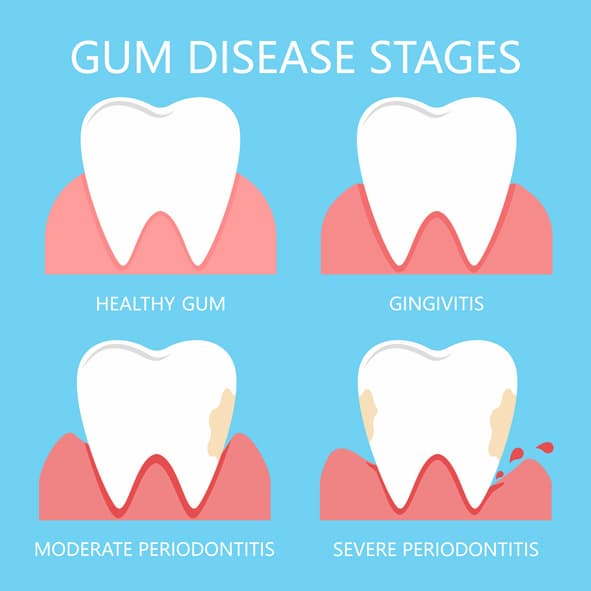
Gingivitis Precedes Periodontitis
The earliest stage of gum disease is called gingivitis, which is one of the most common conditions affecting the oral cavity. You might notice that your gums may become red and swollen and bleed easily. Luckily the symptoms are reversible at this point with proper oral hygiene methods, so that not all gingivitis progresses. When plaque builds up and mineralizes, it then becomes tartar. The longer plaque and tartar are on the teeth, the more harmful they become. If tartar is left untreated, gingivitis can progress to periodontitis. At this point, the bones, gums, and tissue that support the teeth are destroyed. Eventually, the teeth may become loose as well.
Gum disease is usually painless, so it’s difficult for people to realize that they may have it. If you’re wondering how to know if you have it, take heed on the following telltale signs.
Warning Signs of Gum Disease
- Gums that bleed easily
- Red, swollen or tender gums
- Gums that are pulling away (receded) from the teeth
- Chronic bad breath or taste
- Teeth becoming loose
- Change in the way that teeth fit together when biting
- Change in the fit of partial dentures
It is crucial to control the progression of gum disease, and that means plaque removal on a daily basis. Daily flossing is also significant in reaching in between the teeth, where a toothbrush cannot. Twice-a-day toothbrushings, along with professional dental cleanings twice a year, are ways to prevent gum disease.
Risk Factors for Gum Disease
Sometimes your daily oral health routine can be more than just taking care of your mouth. Gum disease can not only affect your oral health but your general health as well. There has also been some indication of the association between gum disease and systemic illnesses, such as stroke and diabetes. According to the American Dental Association (ADA) Mouth Healthy site, untreated gum disease may make diabetes worse by making it harder to regulate your blood sugar. Other risk factors include:
- Smoking or chewing tobacco
- Genetics
- Malocclusion of teeth (more difficult to keep clean)
- Pregnancy
- Poor oral hygiene habits
- Medications, (e.g., steroids, anti-epilepsy drugs, cancer therapy drugs, some calcium channel blockers, and oral contraceptives)
What is gum disease, if not an opportunity to ensure you embrace proper oral hygiene? Consistent and thorough toothbrushing and flossing techniques are the most effective methods to remove food particles and plaque, preventing gum disease before it has a chance to set in. Improving these oral health habits will dramatically benefit the longevity of your smile and your overall health.
